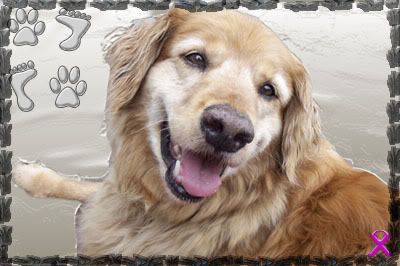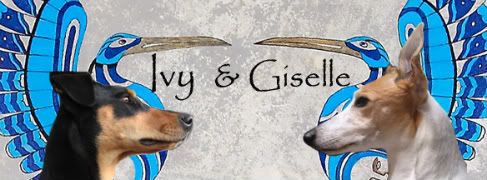Wow, exciting! =0) I can't wait to hear more about the possible puppy! There is soooo much to raising a puppy, I could write a novel. Here are my best tips, as far as what works for Fozzie:
-Create a schedule to live by!! I hate schedules, but it's easier than trying to figure out when you took him for a potty break last, when you fed him last, etc.
-Feed 3-4 small meals per day and take puppy outside 30 minutes after eating. Especially if feeding raw, the moisture will go right through him/her after around 30 minutes. I really do not recommend free-feeding, all of the pups I know who are free-fed are way too roley poley and took longer to housetrain. It's best to keep your puppy on the lean side.
-Short, frequent play sessions outdoors (I play with Fozzie at least 8 times through out the day, for 10-20 minutes) is healthier than looong play sessions & outdoor trips. It gives more opportunities to go potty, prevents over-heating, and most of the day if my pup isn't playing outside, he will settle down and nap inside. It has taught him to be calm indoors, and gets his energy out so he doesn't get bored inside and decide to chew stuff up.
-Leave chewies around for the puppy! At one point during teething, they chew almost constantly, so keep a variety of safe chews available for the pup. I rotate chewies, but I leave a few in his most frequented rooms (living room/sitting room/kitchen) which includes 2 puppy kongs, rolled Merrick rawhide, other Merrick chews such as Bully Sticks & Cow Tails, Teething rings, Nylabones, etc. I always keep an eye on him while he's chewing, but with such good chews around he almost always picks his own toys over furniture & carpet. I know you'll be feeding RMB's, too, which will help satiate his urge to chew.
-Teach a rock-solid "come" from day one! This is super important. Keep your pocket full of tiny treats so that you can call him to you often and reward him for coming. Also teach "watch", so the pup learns that following you means fun & treats. If the pup does slip out the front door, just be sure you get his attention somehow and run playfully the other way... he will be much more likely to follow you, and much more likely to run as fast as he can away from you if you chase him.
-Take him/her everywhere that is not a food store! Most places will allow you to bring in pups, and everyone will want to pet the adorable puppy. Fozzie had met basically every age/gender/style person possible before he was 12 weeks. Anywhere that tons of people frequent is great for socialization, even before you can safely take him out, just carry him and let people hold & pet him (parks, farmers markets, lakes/beaches, shopping, hardware stores, etc). Be sure you instruct people not to act super-excited and talk to your pup in a loud voice, keep it low-key and short when they're young.
-Make sure you give your adult dogs plenty of attention and praise them for being nice to the pup. For the first few weeks, limit their time together and either keep the puppy in an x-pen in the kitchen or living room, or baby-gate off an area for the puppy. That way, the pup will not become too attached to your other dogs, your other dogs won't be driven crazy or get jealous, and it's easier to prevent arguements and keep track of all the dogs. Give them each seperate time to exercise, train, and cuddle with you. If you're petting your adult dogs and your puppy runs over to get attention, hold him back with a foot or another hand or a leash, or whatever. Just make sure you aren't pushing your adult dog aside when the puppy runs over, AND make sure you don't push the puppy away if you're petting him and your adult dog comes to you wanting attention.
-As for crating... my general rule is no longer than 3 hours in a crate for a pup under 16 weeks. Make sure you give the pup a handful of goodies, a stuffed Kong, their meal, etc, when they go into their crate.
-For hand biting, either making a high-pitche yelping sound and turn away, or make a low growly sound. Playing with other puppies & well-socialized adult dogs will help SO much with bite inhibition. Play tug games with your puppy to teach good inhibition, too.







 Reply With Quote
Reply With Quote
 timber still chews a little bit at about 4 months old but i think maybe it would've been a better idea to get an older dog... but i still love my timmy!
timber still chews a little bit at about 4 months old but i think maybe it would've been a better idea to get an older dog... but i still love my timmy! 

 )
)


 For those who fed their puppy raw, did they find it to be much different than feeding it to an adult? Anyting they learned about feeding puppies raw through the experience?
For those who fed their puppy raw, did they find it to be much different than feeding it to an adult? Anyting they learned about feeding puppies raw through the experience?

Bookmarks